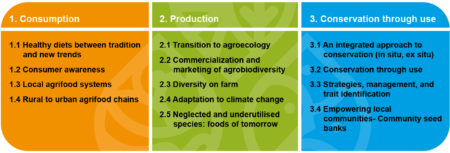- Follow Luigi on Twitter.
- Follow Jeremy on Twitter. And subscribe to his newsletter: citrus and shit this week.
- Speaking of shit…
Nibbles: Seed edition
- Seed stories.
- Heterogenous seeds book chapter.
- Heritage seeds in Britain book.
- Seed app. For tricot trials.
- Seed Treaty ratified in Nigeria.
What have genebanks done for us lately?
Quick alert for a couple of special issues of journals dealing with crop diversity issues:
- Food Security: genebank impacts. More info on the Genebanks Platform website.
- Crop Science: pre-breeding using crop wild relatives. Blog post from the Crop Trust website.
There should be more blog posts coming out soon on a number of these papers, and you can keep track on the Crop Trust Twitter feed.
Brainfood: Pollinator decline, Diet diversity, Collectors, CBD indicators, Herbaria, Fusarium wilt, Genomic breeding, Niche markets, Study design, American CWR, Domestication limits
- No buzz for bees: Media coverage of pollinator decline. Nobody cares. Unless it’s linked to climate change.
- Climate impacts associated with reduced diet diversity in children across nineteen countries. Something else that’s linked to climate change and too few care about.
- People are essential to linking biodiversity data. Seriously, get an ORCID ID.
- Why European biodiversity reporting is not reliable. It’s the free indicator choice in CBD reporting is what it is. Also, not enough attention to genetic diversity. Now, where have I heard that before?
- Reversing extinction trends: new uses of (old) herbarium specimens to accelerate conservation action on threatened species. Not just useful in generating new knowledge (including on genetic diversity), can also be used as seed sources and in public awareness.
- Ex Ante Assessment of Returns on Research Investments to Address the Impact of Fusarium Wilt Tropical Race 4 on Global Banana Production. Conventional breeding for resistance could lift almost a million people out of poverty. That would be quite the indicator.
- Genomic resources in plant breeding for sustainable agriculture. Would help with the above.
- Can Niche Markets for Local Cacao Varieties Benefit Smallholders in Peru and Mexico? Maybe. Read it, it’s not that long.
- Quantifying and addressing the prevalence and bias of study designs in the environmental and social sciences. Everyone should use randomised designs and controlled observational designs with pre-intervention sampling. No, you did not just waste your time reading the above.
- Crop wild relatives of the United States require urgent conservation action. 60% of 600 native taxa need urgent help.
- Limits and constraints to crop domestication. Most of the world’s 2000 crops are not fully domesticated, for reasons such as trait architecture, lack of diversity in domestication traits, accumulation of genetic load and gene flow from the above. But something can be done about it.
And we’re off…
The call for abstracts for the 2nd International Agrobiodiversity Congress – Agrobiodiversity for Food System Transformation, is now open. The Congress, scheduled for October 2021, will focus on the role that agrobiodiversity can play in positively changing our food systems. The deadline for abstract submission is 18 April 2021.
Go for it.
